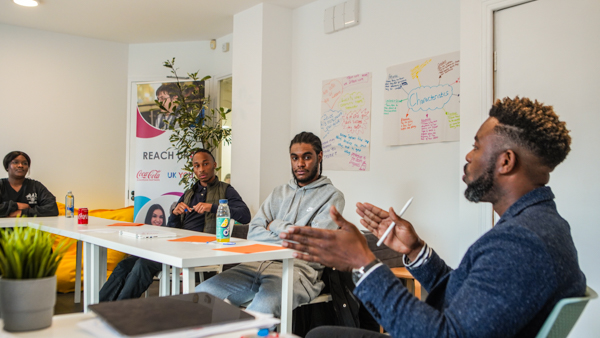I recently took part in a panel event hosted by the Local Coworking Association to discuss social impact. One of the questions on the table asked how key stakeholders and potential funders measure Impact. It really got me thinking about who defines our mission here at Impact Brixton.
As a social enterprise in the heart of Lambeth, whose beneficiaries are primarily local residents, it’s crucial for us to understand the issues facing the community in our area. Our local authority, Lambeth Council highlights some really important problems in their Economic Resilience Strategy; including the fact that Black residents are four times more likely to be unemployed than white residents, a third of Black Caribbean kids are eligible for free school meals, (higher than the national average) and the proportion of Lambeth residents starting an apprenticeship is half the national average.
The council’s response to these problems is to focus heavily on employability, with KPIs relating to things like reducing the percentage of working-age residents with NVQ level 1 or below, and increasing the percentage of 16-17 year-olds participating in education and training. This is perhaps not surprising, given that councils are directly responsible for formal education provision; it’s familiar and straightforwardly within their power to provide courses, placements and so on. These KPIs are used when deciding what projects to fund and support, to make sure the ones with the greatest potential impact are prioritised.
Great Ideas Don’t Always Fit in Tick-boxes
But it’s not always possible to satisfy a criteria that’s been externally defined. As an entrepreneur from a deprived background myself, I believe that an entrepreneurial mindset is perhaps the most powerful attribute one can possess when seeking to change their life for the better. An entrepreneurial mindset is inherently aspirational, optimistic and imbues a person with a thirst for learning new things, solving problems and engaging with a wide variety of people. But the best way to gain this is not through a college course; it’s through rolling up your sleeves and doing it – and through building connections.
A great example of someone we’ve helped is Gareth Esson, who was introduced to us by his sister in early 2020. Gareth joined and along with his colleagues Daryl and Kylie, decided to base his new creative agency, Guess Design House, at Impact Brixton. We provided them access to space, network and mentorship and in only 11months they have served 10 local businesses including ShoDeck, Brixton Distillery, Trendtype, Cowley RMO, Love Public Speaking, Lorraine Natalie Love and of course Impact Brixton CIC, through design, videography and photography. In addition, they have taught 50+ other early stage entrepreneurs about web design and digital skills, and inspired many to consider entrepreneurship as an alternative to seeking employment. It’s difficult to see how Gareth could have made this kind of progress on a traditional training course or apprenticeship.
Making Our Experience and Expertise Count
How can we work towards doing more of what we are great at, and what we know works, even if it’s not directly aligned with funders’ priorities? As local diverse Brixtonians, our unique perspective is something that we believe, if nurtured, will help us impact our community even more. With this in mind, our goal has always been to get funders to care about what we care about – fostering grassroots entrepreneurship and empowering local residents by creating a truly inclusive, diverse and affordable workspace. We want to spark real positive change for local Lambeth residents and help them realise their potential by providing them access to networks, spaces and new opportunities.
To achieve this we need to do two things. Firstly, to resist the temptation to pivot our services too far towards somebody else’s idea of what works. We need to keep reminding ourselves what we are uniquely good at: helping people to realise their potential and change their lives through entrepreneurship. Secondly, we need to find meaningful ways of measuring our impact, which will ultimately show how entrepreneurship changes lives. Ultimately, by demonstrating that we are addressing the key problems that local people face, we’re keeping alive the conversation about what funders’ KPIs should be, and helping to expand and refine them for everybody’s benefit.
This year we will be investing in our Impact Measurement as a key part of our strategy – looking at how our Social Impact programmes are helping Lambeth’s entrepreneurs to launch, develop and sustain their businesses. This research will inform the development of our programmes, and, we hope, make a valuable contribution to the way that everyone in our area thinks about tackling the most pressing issues for our community.




